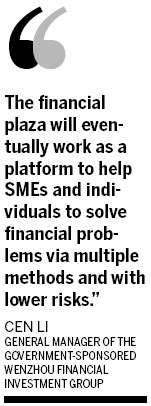A difficult but necessary beginning to recovery
Updated: 2013-03-28 07:39
By Yu Ran (China Daily)
|
||||||||
Officials in charge of the reforms know that it's more than personal pride that's at stake. The fate of the Wenzhou experiment has much wider implications that extend beyond the city. The experience gained here is being closely watched in other cities and regions as they consider launching their own financial reforms.
"This pilot reform in Wenzhou must succeed," said Cen Li, general manager of the government-sponsored Wenzhou Financial Investment Group, which is in charge of Wenzhou Financial Reform Plaza. "The whole nation is watching us."
Brushing off the initial doubts about the reform, People's Bank of China Vice-Governor Pan Gongsheng said recently: "The overall effects of the pilot reform in Wenzhou will require some time for further observation."
In Wenzhou, Zhang Zhenyu, director of the city's financial office and the official in charge of the reforms, said: "We've been trying to move forward the reforms following last year's work, and we're getting prepared to launch new initiatives."
He declined to disclose detail of the planned initiatives. But sources familiar with the plan said the final draft of new regulations on private financing and management by the city's finance office was submitted for review in November 2012 to the Zhejiang provincial government. They said they expect the draft to be approved soon.
Bigger moves
Under the proposed law, the annual loan interest rate would be capped at reasonable levels.
Lenders in the underground money market commonly charge borrowers interest in excess of 25 percent a year. Such high costs are widely blamed for stifling innovation because neither lenders nor borrowers would take the risk.
A new government department is to be established under the proposed law to supervise and regulate companies doing financial and other related businesses. These include moneylenders, loan brokers, pawnshops and investment consultants.
At present, these companies, like all other businesses in Wenzhou, are licensed by the city's commerce department. As such, they are not required to observe any form of banking law although some of them are known to regularly take deposits from clients and lend to borrowers.

When the new law comes into force, all companies doing financial-related businesses will come under the supervision of the new department, which also has the final say in the licensing process, the sources said.
The newly established department is also expected to keep a record of all the loans transacted at companies under its supervision.
In addition, an online credit information system will be launched. It will make available to qualified institutions the credit history of local individuals, with details of credit card purchases and loan repayment records.
"We plan to combine the authorized credit rating database from the People's Bank of China with information gathered by the local industrial and commercial bureau to set up a complete database for lenders' references," said Yu Qian, deputy director of Wenzhou's finance office.
The credit rating database is expected to be up and running by the end of this year.
Other initiatives include the hosting of an investment seminar to showcase Wenzhou's opportunities to more than 1,000 businessmen who have moved overseas.
Cen Li predicted that these overseas entrepreneurs of Wenzhou origin will invest at least 5 billion yuan in various projects in 2013. Last year, they invested 220 million yuan in four projects.

 Li Na on Time cover, makes influential 100 list
Li Na on Time cover, makes influential 100 list
 FBI releases photos of 2 Boston bombings suspects
FBI releases photos of 2 Boston bombings suspects
 World's wackiest hairstyles
World's wackiest hairstyles
 Sandstorms strike Northwest China
Sandstorms strike Northwest China
 Never-seen photos of Madonna on display
Never-seen photos of Madonna on display
 H7N9 outbreak linked to waterfowl migration
H7N9 outbreak linked to waterfowl migration
 Dozens feared dead in Texas plant blast
Dozens feared dead in Texas plant blast
 Venezuelan court rules out manual votes counting
Venezuelan court rules out manual votes counting
Most Viewed
Editor's Picks

|

|

|

|

|

|
Today's Top News
Boston bombing suspect reported cornered on boat
7.0-magnitude quake hits Sichuan
Cross-talk artist helps to spread the word
'Green' awareness levels drop in Beijing
Palace Museum spruces up
First couple on Time's list of most influential
H7N9 flu transmission studied
Trading channels 'need to broaden'
US Weekly

|

|







